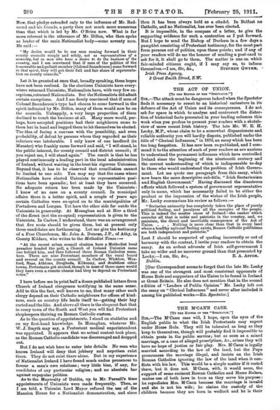THE ACT OF UNION.
[To Tan EDITOR OP ran "SPECTATOlt."] Ssu,—The attack must be dangerous indeed when the Spectator finds it necessary to resort to an historical caricature in its
defence of the Act of Union and its consequences. I do not , ask for space in which to analyse and controvert the distor- tion of historical facts presented in your leading columns this week when you profess to present your readers with a sketqh- view of more recent Irish history. The late Mr. W. E. H. Lecky, M.P., whose claim to be a somewhat dispassionate and reliable authority you will hardly dispute, published under the title of " Clerical Influences," in 1870, an essay which has been too long forgotten. It has now been re-published, and I com- mend it to the attention of such of your readers as are anxious to understand the permanent influences which have controlled Ireland since the beginning of the nineteenth century and the correct understanding of which is indispensable to-day to those who would understand the problem of Irish Govern- ment. Let me quote one paragraph from this essay, which now bears the more descriptive sub-title, " Irish Sectarianism and English Government." Having discussed the disastrous effects which followed a system of government representative only in name, which has necessarily failed to be either the
product or the impression of the wishes of the Irish people, Mr. Lecky summarises his review as follows:— "Sectarian animosity has completely taken the place of purely political feeling, and paralyses all the energies of the people. This is indeed the master curse of Ireland—the canker which corrodes all that is noble and patriotic in the country, and, we maintain, the direct and inevitable consequence of the Act of Union. . . . Nothing is more clear than that in every land where a healthy national feeling exists, Roman Catholic politicians are both independent and patriotic."
Lest I should be suspected of quoting incorrectly or out of harmony with the context, I invite your readers to obtain the
essay. As an ardent advocate of Irish self-government I take no wider and no narrower ground than that presented by [Our Correspondent seems to forget that the late Mr. Lecky was one of the strongest and most consistent opponents of Home Rule and supporters of the Union to be found in Ireland or Great Britain. He also does not mention that in the second edition of "Leaders of Public Opinion" Mr. Lecky left out the essay on " Clerical Influences " and never after included it among his published works.—En. Spectator.1






































 Previous page
Previous page